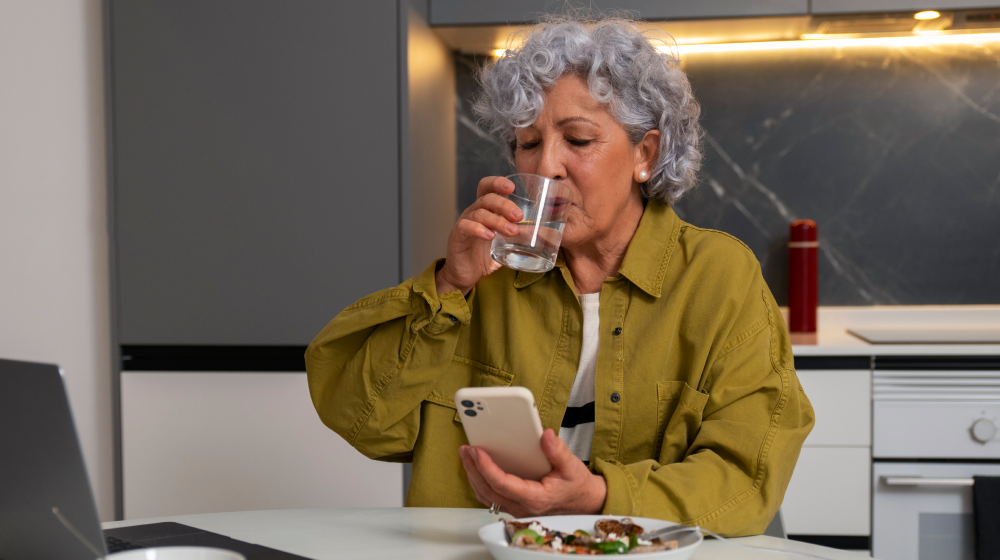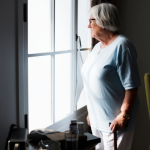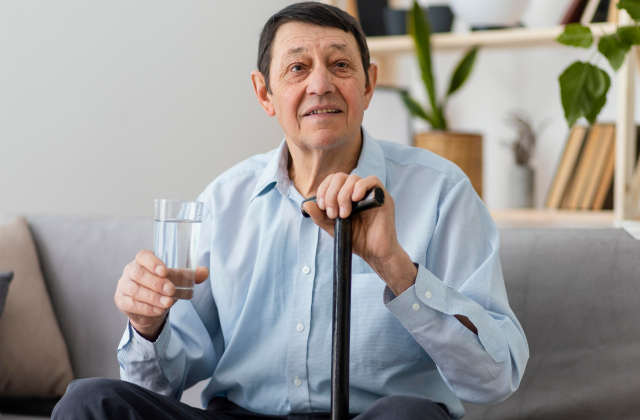Make Sure Seniors Get Enough Water by Keeping Them Hydrated
Helping seniors stay well-hydrated goes beyond physical health; it is also fundamental to their quality of life. Dehydration in seniors is an ongoing problem that is often underestimated. Residents may experience significant negative health consequences as a result of dehydration, including confusion/disorientation, too little fluid in the body, weakened immune function, and possibly even hospitalization. Hydration in the elderly is an issue that needs focused attention in home care where we are trying to create a setting that helps the body have a healthy balance of fluids. Our caregiver specialist will review how to ensure seniors drink enough water and remain hydrated, while exploring ideas to keep your loved one healthy.
Why Hydration Is Important For The Elderly
As we age, we lose the ability to retain water, which creates a greater vulnerability to becoming dehydrated. In addition to this, many physiological changes occur with aging that can affect hydration; such as less desire to drink and lowered kidney function, both of which can complicate fluid level regulation. Proper water intake is noticeably significant for well-being, organ function, and mental health despite the aging body.
“Hydration is at the core of health, but particularly for the older adults whose health and comfort can noticeably change with even small changes in fluid.” — Angel Care Inc. NY
How Much Water Should An Elderly Adult Drink?
A common question that caregivers ask is ‘How much water should older adults drink?’. Standard recommendations for water intake for adults may not be directly transferable to older adults. Older adults can still afford to drink less water than young adults drink, but this does not mean that they can afford to neglect their hydration. A senior adult needs an average of 1.5 to 2 liters of water per day but the amount of hydration can vary depending on activity level, climate, health issues, and diet. Also, keep in mind that seniors will have some hydration from their food as well (primarily fruits and vegetables).

Signs of dehydration in senior adults
The signs of dehydration in senior adults can be less apparent and can often be mistaken for something else. Because of this it is very important to always get a prompt diagnosis.
The signs of dehydration in senior adults can include:
- Fatigue, weakness, dizziness
- Dry mouth and dry skin
- Decreased urination, dark urine
- Disorientation, slower reaction time, irritability
- Loss of appetite
If you notice any of these signs in your family member don’t hesitate to get in touch with their healthcare practitioners. The sooner you take action, the easier it is to avoid hydration complications.
How do you manage hydration in senior adults.
Managing hydration in senior adults is not just about maintaining the proper water balance, part of it is about establishing proper water intake habits. Below are some simple suggestions.
- Frequent water intake throughout the day
Ask seniors to drink water at scheduled times during the day, even if they are not thirsty. Staying hydrated all the time is an important part of their health regimen. - Adding liquid nutrition to the diet
Add in watermelon, cucumbers, citrus fruits to the meals these fruits will help enhance hydration. - Humidifier
Excessive dry air is a contributing factor to possible dehydration (especially during the heating season), and a humidifier can help maintain normal humidity in the room. - Medications and overall health considerations
Some medications may be a contributing factor to dehydration, and chronic conditions (i.e., diabetes) require greater hydration management.
Some Tips on Hydration for the Elderly while at Home
- Use technology-based reminders
Smart watches and mobile apps can be helpful reminder devices for seniors who may forget to drink water regularly, or do not understand the importance of hydration. - Offer water in forms other than just plain water
Some seniors may prefer herbal teas or broths in addition to plain water. A variety of liquid types is useful in helping seniors stay hydrated. - Understand their preferences for water temperature
Some seniors may not drink water if it is too cold. Gradually introducing room temperature, or even warm water may help encourage them to drink.
Monitoring hydration status in seniors
Senior hydration monitoring is extremely important as we want to keep hydration status adequate to prevent dehydration, as well as promote their overall well-being. Regular health checks, monitoring of their urine color, and tracking how many fluids they drink daily (and documenting what types of fluids) can help prevent problems. It could be useful to have a hydration journal for seniors to track the amount of water consumed on a daily basis, and to pick up patterns or a need for increased fluids.
Hydration considerations for elderly care agencies to implement
- Water should always be available in all rooms
- Offer water in small portions distributed throughout the day, to get them to drink frequently.
- Use education to promote the importance of hydration, and also to make drinking water a pleasant and enjoyable habit.
Conclusion:
Effective hydration for elderly individuals, while at home, is an important aspect of maintaining a healthy lifestyle. With just a few simple adjustments to drinking water habits, we can significantly enhance health status and overall well-being. Angel Care Inc. NY takes a person-centered approach to elderly care that also includes hydration consultation and individualized approaches to care planning – to make every day live with health and energy.
“Hydration is not just a habit, it is the first line of health. Regular adequate hydration increases the quality of life for elderly individuals for years to come.” – Angel Care Inc. NY

Designing a living space that accommodates the needs of seniors is an essential step in promoting successful aging in place. At Angel Care Inc. in New York, we fully understand the critical role home safety plays in the lives of older adults, particularly when it comes to fall prevention and maintaining their independence. In this article, we present a comprehensive guide filled with practical strategies to enhance home safety for seniors, along with essential modifications and tips to ensure older individuals can live in their homes safely and autonomously. The Significance of Senior Home Safety As individuals age, the likelihood of accidents and injuries increases, particularly within the home. The Centers for Disease Control and Prevention (CDC) reports that one in four seniors experiences a fall annually, with many of these incidents leading to severe injuries. This makes it crucial to focus on elderly fall prevention at home and implement necessary adaptations in various areas to reduce the risk of falls. Senior proofing a home goes beyond simple fixes; it involves transforming the environment to provide a safe, secure, and supportive space that fosters independence while safeguarding the well-being of its residents. Senior Home Safety Modifications: Essential Tips Here are some senior home safety modifications that can help reduce fall risks and improve safety for older adults: Home Modification How It Enhances Safety Install Grab Bars in Bathrooms Grab bars help seniors maintain balance when getting in and out of the shower or bath, preventing slips. Add Non-Slip Rugs and Mats Using non-slip rugs or mats in high-traffic areas (especially bathrooms and kitchens) reduces the risk of tripping. Improve Lighting Bright, even lighting reduces shadows and prevents tripping hazards. Install nightlights in hallways, bathrooms, and stairs. Use Raised Toilet Seats Raised toilet seats make it easier for seniors to sit and stand, reducing strain and the risk of falls. Install Stair Railings Secure railings on both sides of stairs provide additional support and stability, reducing the risk of falling. Create Clear Pathways Keep walkways and corridors free from clutter. Clear paths ensure easy mobility and reduce tripping hazards. Minimizing Fall Risks for Seniors at Home Falls present a significant concern for seniors, making elderly fall prevention a top priority in the home. To effectively reduce the risk of falls, consider the following strategies: Eliminate Tripping Hazards: Keep the floor clear of clutter and ensure that loose cables and cords are properly secured. Furniture and rugs should be placed in a way that avoids obstructing pathways. Choose Proper Footwear: Seniors should wear non-slip, supportive shoes inside the home, avoiding slippery socks or sandals that could cause a fall. Review Medications: Some medications can affect balance or cause dizziness, increasing the risk of falls. Seniors should regularly consult their healthcare provider to review medications and manage any side effects that may heighten fall risks. Invest in a Medical Alert System: While taking safety precautions is important, the peace of mind provided by a personal emergency response system (PERS) is invaluable. With the simple press of a button, seniors can summon help from emergency responders in the event of a fall. Safety Devices for Seniors Alongside home modifications, integrating essential safety devices can greatly enhance overall home safety. Key devices to consider include: Fall Detection Sensors: Wearable devices that detect falls and notify caregivers or emergency services, ensuring help is on the way. Smoke and Carbon Monoxide Alarms: Install alarms on every level of the home, particularly outside sleeping areas. Regularly test alarms to ensure they are functioning properly. Medical Alert Systems: Simple devices that allow seniors to call for help at home or in their yard. Smart Home Devices: Integration with devices like Amazon Alexa or Google Home allows seniors to control lighting, adjust temperature, and receive medication reminders, promoting safety and convenience, especially for those with mobility challenges. Motion-Sensing Lights: These lights automatically activate when someone enters a room or hallway, providing illumination without the need to find light switches. Creating a Safe Living Space for Seniors Ensuring a safe living space goes beyond structural adjustments; it involves fostering an environment that promotes safety and independence. Here are a few additional safety tips for seniors: Establish a Routine: A structured daily routine can help seniors navigate daily tasks more easily, reducing the physical and mental strain of decision-making and time management. Encourage Socialization: Seniors living alone may experience isolation, which can impact both their physical and mental health. Regular interaction with caregivers, family, and friends helps maintain normalcy and emotional well-being. Daily Check-ins: Whether through a phone call, video chat, or in-person visit, daily check-ins provide emotional support and offer an opportunity to address potential safety concerns. The Importance of Senior Home Safety Modifications At Angel Care Inc., we understand that making a home safe for seniors is a process that requires careful consideration and effort. We are committed to providing guidance on senior home safety modifications to help minimize fall risks and create an environment where seniors can feel safe, confident, and independent. Creating home adaptations that prioritize elderly safety is essential for the well-being of seniors and offers peace of mind to their families. If you or a loved one require assistance with senior home safety modifications or the installation of safety devices, don’t hesitate to reach out to HHA Angel Care Inc. Our team of trained professionals is here to help you ensure the comfort and safety of your loved ones. "A safe home is not only minimizing risks, it is enhancing quality of life for seniors!" — Angel Care Inc. NY

From the Professionals at Angel Care Inc., NY With increasing age, being independent is the most cherished for the majority of seniors. At New York's Angel Care Inc., we understand the importance of staying independent while, simultaneously, ensuring the safety and well-being of the elderly. Our caregivers and professionals are committed to providing home care to ensure senior independence, which allows seniors to remain at home and live comfortably and with dignity. In this article, we’ll explore practical caregiving tips to promote senior independence, offer advice on home modifications for independent living, and discuss how technology to support senior independence can empower seniors to live on their terms. Why Maintaining Independence in Elderly is Crucial A desire to be independent is a desire that is shared by everyone, and it does not change across age groups. For the elderly, being independent is in proportion to their psychological and mental health. Independence has been found to reverse the tide of depression, loneliness, and worry, which are common among the elderly. But helping the old to live independently requires good planning, support, and appropriate facilities. We at Angel Care Inc. believe in a holistic approach to home care for independent aged individuals, offering services that are tailored to each individual's personal needs. Independent Living Tips for Seniors Following are some tips on caregiving to maintain senior independence, gained from experience: Encourage Regular Physical Activity Exercise regularly to maintain strength, balance, and flexibility, reducing the risk of falls. Gentle exercising through activities like walking, stretching, or yoga can easily be incorporated into daily life. Meal Preparation Assistance Independent living does not mean that seniors need to do any activity on their own. Meal planning and preparation help ensure that seniors get proper nutrition without feeling overwhelmed. Maintain a Routine Consistency is the secret to maintaining seniors' mental acuteness and on an even keel. A daily routine keeps them feeling a sense of normality and being independent. Encourage social interaction It is vital to be socially active. Encourage seniors to stay in touch with friends, family, and community organizations, because social isolation can lead to depression and dementia. Home Care to Help Senior Independence Independent elderly home care is a treasured commodity for families who want to preserve their loved one's independence. We at Angel Care Inc. offer a wide range of services designed to enable seniors to be independent and receive the care they need. Below are some of the ways that our home care services help with elderly independence: Service How It Supports Independence Personal Care Assistance (PCA) Helps with bathing, dressing, and grooming, promoting dignity and self-esteem. Medication Management Aids in ensuring medication is taken correctly and on time, precluding unnecessary hospitalization. Companionship Provides social contact and emotional support, warding off loneliness and fostering mental health. Light Housekeeping Helps keep the home environment clean and well-organized, reducing the risk of accidents and improving security. All these services help provide elderly persons with a safe and independent way of living, unencumbered by the hardships of daily living. Home Modifications for Independent Living Modifying home to accommodate seniors can be a huge improvement in their independent living. Below are some independent living home modifications that can enhance safety and functionality: Install Grab Bars in the Bathroom: These offer additional support in getting in and out of the shower or bathtub, minimizing the chances of falls and slips. Provide Sufficient Lighting: Sufficient, even lighting avoids the senior from tripping on items and falling, making it an extremely necessary feature in a safe home for seniors. Clear Passages: Clear passages of anything that can be a hindrance, such as rugs or clutter, to provide a secure environment. Bed Height Adjustment: Beds which are either too high or low may be uncomfortable for seniors when entering or exiting. Bed height adjustment may aid in safe mobility. Technology to Foster Elder Independence Technological developments have made living independently easier than ever for the elderly. The right technology has the ability to improve safety, convenience, and peace of mind for seniors and their families as well. Some of the technologies that we recommend are: Fall Detection Systems: Wearable devices that can alert caregivers automatically when a fall is detected, so that the response is quick. Remote Medication Reminders: Equipment and apps that prompt older adults to take medication at the correct time, avoiding missing a dose. Smart Home Devices: Voice-operated devices like Amazon Alexa or Google Home allow older adults to control lights, heating, and appliances from the comfort of their sitting position, avoiding unnecessary mobility. Telehealth Services: Older adults will be able to visit their physicians at home, cutting down on travel and enabling immediate care. These technologies allow older adults to remain at home more independently and securely. Ask Angel Care Inc for help today! Sustaining independence as we age is the essence of a happy life. At Angel Care Inc., we are committed to helping the elderly sustain independence using home care to provide senior independence and practical caregiving guidance to enable senior independence. With adequate support, resources, and accommodations, seniors can continue to do well at home. If you or your family member is looking for expert advice in remaining independent at home, independent aging in-home care, or consultation regarding home modifications for independent living, contact Angel Care Inc. today. We are here to assist in making aging in place not just possible but secure and a rewarding experience.



